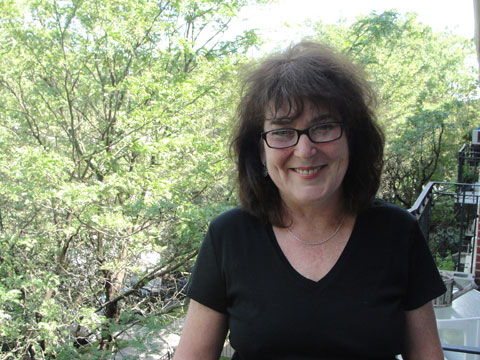
TUMBER ARGUES that the best hope for America rests in places like Lowell and Springfield. |
This month sees the publication by MIT Press of Small, Gritty, and Green: The Promise of America's Smaller Industrial Cities in a Low-Carbon World by Catherine Tumber. Tumber, a former senior editor at the Phoenix, is also the author of American Feminism and the Birth of New Age Spirituality: Searching for the Higher Self, 1875-1915 (Rowman and Littlefield, 2002) and co-editor (with Walter E. Fluker) of A Strange Freedom: the Best of Howard Thurman on Religious Experience and Public Life (Beacon, 1998). She is also a former research affiliate in the Community Innovators Lab in MIT's Department of Urban Studies and Planning.In her new book, Tumber argues that the best hope for an economically revitalized, greener America — one no longer built on carbon-based economies — comes from the kinds of smaller industrial cities that have in many cases been given up for dead: from Flint and Youngstown to Springfield and Lowell. Tumber sees cities like these — with their small, manageable infrastructures and history of industrial manufacturing — as the potential epicenters for the US's emerging green economy, as well as for small-scale farming. We talked about these issues and more over lunch and via e-mail — and we also talked about the big-city dweller's prejudice against smaller cities.
I THOUGHT THAT ONE OF THE MORE DEVASTATING ANALYSES YOU OFFER IN THE BOOK IS OF THE EFFECT OF BIG-BOX STORES ON SMALL CITIES — HOW THEY DEPRESS THE COMMUNITY TO THE EXTENT THAT THEY ARE THE ONLY PLACES WHERE YOU CAN AFFORD TO SHOP OR WORK. It's an endless feedback loop. The profits are taken out of the community by corporate owners who live in distant, larger cities like New York and Atlanta. . . . They're also really expensive for communities. The smaller the community, the more disproportionately expensive they are.
HOW SO? It creates a lot of infrastructure that taxpayers pay for in order to build these places. And because of the way that they move with impunity every 10 years or so, that infrastructure ends up carrying a very high price tag. At the same time, usually the areas where these stores want to sprawl happen to be some of the richest farmland on Earth — the Midwest, "the Nation's Bread Basket." So smaller communities not only lose through participating in this downward cycle of a lower standard of living, they also lose one of their important natural assets for the future. In a sustainable economy, there will have to be more attention paid to local food systems. And here they have this brilliantly important and irreplaceable asset — the land — and the sprawling nature of the big-box store model takes that away from them, too.
AREN’T THERE FEDERAL PROGRAMS, LIKE HUD, THAT CAN HELP THESE CITIES? Well, yes, but federal programs generally lump them together with large cities, and large cities have more political clout. Since a lot of federal money goes to the states for distribution, much depends on how individual states regard their smaller cities. Massachusetts does relatively well in this regard, thanks, in part to public policy think tank MassInc [Massachusetts Institute for a New Commonwealth], which has been pushing the interests of our smaller cities, what it calls Gateway Cities, for a long time now. The Federal Reserve Bank of Boston has also taken unusual interest in the region’s smaller industrial cities, and in 2009 launched a special initiative for economic development in Springfield.
 Topics
Topics:
Books
, Books, Arts, MIT Press, More  , Books, Arts, MIT Press, Interviews, Less
, Books, Arts, MIT Press, Interviews, Less 